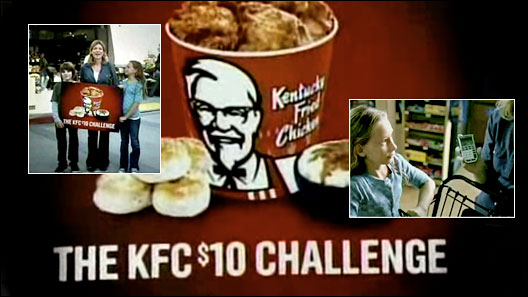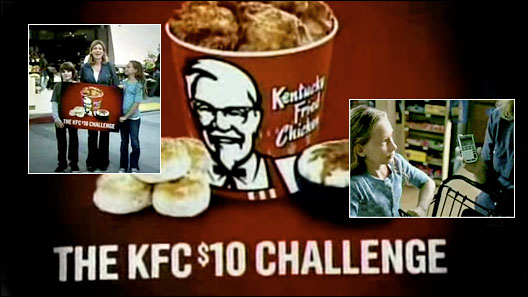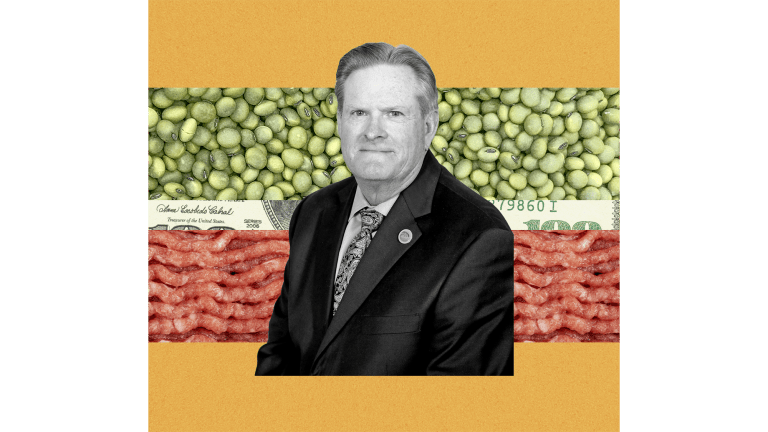
Recently, the American public was issued a challenge by the folks at KFC (formerly “Kentucky Fried Chicken,” but “fried” just didn’t sound healthy). The fast-food joint argues in its latest commercial that you cannot “create a family meal for less than $10.” Their example is the “seven-piece meal deal,” which includes seven pieces of fried chicken, four biscuits, and a side dish — in this case, mashed potatoes with gravy. This is meant to serve a family of four.
I’m not really a competitive soul, but this was one challenge I could not resist. When it comes to food, America has been sold a bill of goods. We’ve been flimflammed, bamboozled, hoodwinked. We’ve been tricked into thinking that cooking is a chore, like washing windows, to be avoided if at all possible, and then done only grudgingly and when absolutely necessary. On the contrary, cooking is a vital, spiritual act that should be performed with a certain reverence. After all, we are providing sustenance to the ones we love — can anything be more important?
And don’t get me started on advertising. It never ceases to amaze me that, with the exception of political ads, people don’t focus on the falsehoods. Commercial advertising washes over people without the slightest analysis; we truly need a FactCheck.org for business advertising.
In the KFC commercial, a mother and two kids hit a grocery store for the necessary ingredients. When they fail to get them for under $10, Mom cheerfully announces, to the kids’ delight, that they are going to KFC. In these hard economic times, Colonel Sanders wants you to think that giving him your money is the cheaper way to go. I respectfully disagree.
Groceries, Point Blank
The ingredients shown or mentioned in the ad include seven pieces of chicken, a five-pound bag of flour, and — in an oh-so-adorable scene featuring the son and a clueless store clerk — “seven secret herbs and spices.” The rest of the ingredients are presumably edited out for time.
The grocery store itself has the look of a somewhat higher-end place (read: more like a Whole Foods than a Wal-Mart). Since we don’t have a Whole Foods in Iowa, and I can’t get myself to give Wal-Mart money, I compromised and shopped at a local independent grocery called the Bread Garden Market. They do a nice job of splitting the difference between organic and everyday; in other words, they carry both Kashi and corn flakes, tofu and ground beef.
The recipes I used are available to anyone with access to The Joy of Cooking (mine’s the May 1985 edition), but for convenience they’re at the end of this article.
I compared commodity products and organic ones, and calculated for each. The market had only one kind of chicken. It was far from the free-range, organic, local chicken I would normally use, but it was hormone-free from a network of family farms and faced nowhere near the cruel conditions suffered by KFC’s chickens. One of the latter would have been even cheaper than the $4.76 I paid for this one. In fairness I should note that the little girl in KFC’s ad asks the butcher for seven pieces, already cut up, but I have faith that a home cook can cut up a whole chicken. I should also note that KFC cuts chicken breasts in half, so there are 10 pieces in a whole bird (four breast halves, two legs, two thighs, two wings).
I rounded up everything I needed for chicken, biscuits, and mashed potatoes with gravy and totaled my costs, accounting for ingredients that were a fraction of a cent (small amounts of spices, for example) by rounding up to $0.01. I must admit I don’t know the seven secret herbs and spices, but as a professional chef, I know you can do an awful lot with salt and pepper. The bottom line? The KFC meal, including Iowa state sales tax of 6 percent, is $10.58. I made the same meal (chicken, four biscuits, mashed potatoes, and gravy) for $7.94 — and I got three extra pieces of chicken and a carcass to use for soup.
Even allowing for the whole batch of 24 biscuits, the meal still comes in at $8.45. In fact, using organic or other high-end items where the market carried them (flour, grapeseed oil, butter, milk), my total bill for the meal came to $10.62. Here’s a GoogleDocs spreadsheet of my prices in case you want to check my math or compare your own recipe.
I can already hear folks saying, “Sure, but how long did it take you?” Yes, it took a little longer than the drive-thru, but it is important to recognize the value of spending time preparing a good home-cooked meal. How is it, after all, that with all the modern conveniences afforded us in the 21st century, we still don’t think we have the time to do something everyone had time for until the middle of the 20th century?
In America, if we are what we eat, most of us are fast, cheap, and easy. We should aspire to be more, and gathering the family around the table is the best way I know how. Bring your family together around a home-cooked meal. Get them involved in the preparation. Do it so often that it’s no longer an unusual thing in your house. It’ll beat the drive-thru every time because it has the most important ingredient: love.
Kurt’s Seven-Piece Meal Deal
The following recipes were adapted from The Joy of Cooking, 1985 edition.
Pan-Fried Chicken (pg. 424)
8 ounces flour (seasoned with salt and white pepper, or the seven secret spices if you know them)
8 ounces lard, butter, or grapeseed oil (or a mix)
Heat the fat in a large frying pan until fragrant. Meanwhile dredge the chicken pieces in flour, then place in pan. Brown lightly, then turn and brown other side. Turn down heat to medium-low and continue cooking, 35-40 minutes, turning frequently, until cooked through. Serve immediately.
Poultry Pan Gravy (pg. 341)
1/4 cup flour left from dredging
Chopped giblets from the bird, if you like
Enough boiling water from the mashed potatoes to make 2 cups (or boiling stock, if you have it made already)
Salt and black pepper to taste
Heat the oil in a new pan over medium-high heat and add flour to make a roux (a thickener made of equal parts flour and fat). Cook, stirring constantly, for 3-5 minutes. Add giblets and boiling water or stock. Simmer 15 minutes. Season to taste and serve immediately.
Mashed Potatoes (pg. 318)
This recipe says it serves 6, but I figured 4, since everybody wants more potatoes.
3 tablespoons butter
1 teaspoon salt
1/2 cup hot milk
Boil the potatoes in 4 cups of water until tender (about 20 minutes). Strain and reserve water for gravy if desired, and mash potatoes to desired texture with remaining ingredients. Adjust seasonings to taste and serve immediately.
Buttermilk Biscuits (pg. 634)
Yield: 24 1.5-inch biscuits
1/2 teaspoon salt
2 teaspoons double-acting baking powder
1 teaspoon sugar
1/2 teaspoon baking soda
1/4 cup lard or 5 tablespoons butter (cold, diced)
3/4 cup buttermilk
Preheat oven to 450 degrees F.
Sift together the dry ingredients, then cut in the butter or lard. Stir in the buttermilk until just incorporated, then turn out onto a floured surface and knead for 30 seconds. Pat down to 1/4 of an inch thick, then cut with biscuit cutter.
Bake on sheet pan 10-12 minutes.



